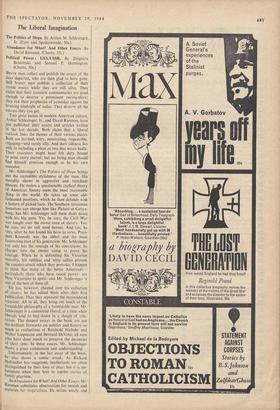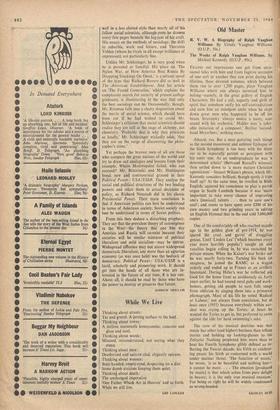The Liberal Imagination
Political Power : USA/USSR. By Zbigniew Brzezinski and Samuel P. Huntington. (Chatto, 50s.)
BRAVE men collect and publish the essays of the dear departed, who are then glad to have gone. Still braver men publish a collection of their recent essays while they are still alive. They Claim that their transient commentaries are good enough to deserve a permanent resting-place; they risk their prophecies of yesterday against the bruising hindsight of today. They deserve all the success they can get.
Two great names in modern American culture, Arthur Schlesinger, Jr., and David Riesman, have Just published their essays and articles written in the last decade. Both claim that a liberal outlook links the themes of their various pieces. Both are learned, witty, penetrating, responsible, engaging—and rarely silly. And their silliness lies only in including a piece or two that wears badly. Their executors might have felt duty bound to print every morsel; but no living man should find himself precious enough to be his own executor.
. Mr. Schlesinger's The Politics of Hope brings out the incredible stylishness of the man. His morality shows in aggressive and trenchant Phrases. He makes a questionable cyclical theory of American history seem the most reasonable thing in the world. He takes up some old- fashioned positions, which he then defends with a battery of.picked facts. The Southern revisionist historians can charge him like Pickett at Gettys- burg; but Mr. Schlesinger will mow them down With his big guns. Yes, he says, the Civil War Was fought over the moral issue of slavery. Yes, he says, we do still need heroes. And yes, he says, after he has found his hero to serve, Presi- dent Kennedy was the ablest and the most fascinating man of his generation. Mr. Schlesinger not only has the courage of his convictions; he Charges into the enemy camp to prove his Courage. When he is defending his Victorian morality, his ruthless and witty sallies prevent the counter-attack which they provoke. I happen to think that many of the better Americans— Particularly those who have tasted power— are New Victorians in spirit; and Mr. Schlesinger is one of the best of them all.
He has, however, cheated over his collection of essays; he has edited them after their first Publication. Thus they represent the reconsidered transient. All in all, they bring out much of the formidable philosophy of a formidable man. Mr. Schlesinger is a committed liberal, at a time when liberals tend to bog down in a slough of rela- tivism. The deepest essays in the book are not the brilliant fireworks on politics and history so
, much as evaluations of Reinhold Niebuhr and Walter Lippmann and Bernard DeVoto, all men Who have done much to preserve the decencies of their time. In these essays, Mr. Schlesinger shows a great compassion and understanding. Unfortunately, in the last essay of the book, he also shows a comic streak. As Richard Hofstadter has suggested, intellectuals are often distinguished by their love of play; but it is un- fortunate when they love to reprint stories of family playtime.
In Abundance for What? And Other Essays, Mr. Riesman substitutes observations for morals and Statistics for imperativzs. He writes ' wisely and
well in a less clotted style than nearly all of his felloW social scientists, although even he drowns every few pages beneath the Jog-jam of his craft. His essays on the methods of sociology, the drift to suburbia, work and leisure, and Thorstein Veblen (whom he rivals in all except brilliance of expression), are particularly fine.
Unlike Mr. Schlesinger, he is very good when he is personal or fanciful. His piece on 'The Nylon War, or How America Beat Russia By Dropping Stockings On Omsk,' is a serious spoof of the type that Richard Rovere did so well in The American Establishment. And his article on 'The Found Generation,' which explains the complacent search for security of present college graduates, is illuminating in the way that only the best sociology can be Occasionally; though, Mr. Riesman falls into a chatty dogmatism about the merits of social science, which, should have been cut if he had wished to avoid Mr. Schlesinger's criticism that social scientists should realise they are still at the stage of alchemy,, not chemistry. 'Probably that is why they proclaim so loudly,' Mr. Schlesinger wickedly adds, 'that they are on the verge of discovering the philo- sopher's stone.'
Yet perhaps the bravest men of all are those who compare the great nations of the world and try to draw out analogies and lessons from their example. Where Montesquieu failed, who can succeed? Mi. Brzezinski and Mr. Huntington break new and controversial ground in their Political Power : USA! USSR. They analyse the social and political structures of the two leading powers and relate them to actual decisions of policy, as Richard Neustadt did in his classic Presidential Power. Their main conclusion is that if American politics can best be understood in terms of Arnerican society, Soviet society can best be understOod in terms of Soviet politics.
From this they deduce a disturbing prophecy. They say that the prevalent theory of convergence in the West—the theory that one fine day America and Russia will co-exist because their societies will be similar mixtures of political liberalism and mild socialism—may be untrue. Widespread affluence may not assure widespread democratic liberalism, any more than an agrarian economy (as was once held) was the bedrock of democracy. Political Power.: USA I USSR is a lucid, scholarly and pioneering work. It should get into the hands of all those who are in- terested in the future of our time, if it has one. Above all, it should be read by those who' have the power to destroy or preserve that future.
ANDREW SINCLAIR



































 Previous page
Previous page